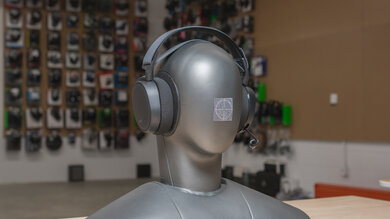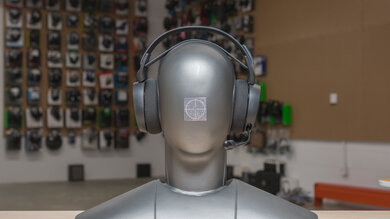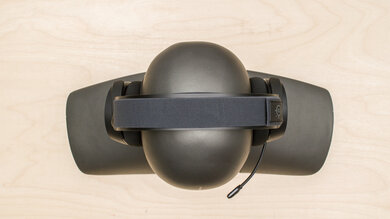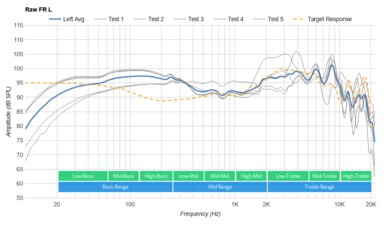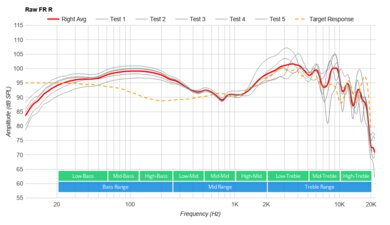The SteelSeries Arctis 7+ Wireless are the updated sibling of the SteelSeries Arctis 7P+ Wireless. While they have a similar design to other headphones in this lineup, their chat mix wheel sets them apart, allowing you to adjust the amount of music and chat audio you hear. They also support Sonar, a software integrated into SteelSeries GG software that offers more robust features, including a parametric EQ and a 7.1 Virtual Surround feature for a more immersive audio experience. Overall, they have long-lasting continuous battery life and decent mic performance. They also have low non-Bluetooth wireless latency thanks to their USB-C dongle, and their fit is comfortable enough for long gaming sessions.
Our Verdict
The SteelSeries Arctis 7+ are decent for neutral sound. Out of the box, they have a very boomy sound that muddies vocals and lead instruments. They also have inconsistent audio delivery, and if you have thick hair or wear glasses, you may especially notice a drop in bass. That said, you can tweak their sound to your liking using their companion app's graphic and parametric EQs as well as EQ presets.
- Well-built and comfortable design.
- Disappointing frequency response consistency.
The SteelSeries Arctis 7+ are passable for commute and travel. They're not designed for this purpose as they're bulky, and you need to use their USB dongle if you want to use them wirelessly. They also don't block out the low rumble of bus and plane engines and don't come with a case to help protect them when you're on the go. However, they have long-lasting continuous battery life and are well-built.
- Well-built and comfortable design.
- Over 60 hours of continuous playback time.
- Disappointing frequency response consistency.
- Poor noise isolation performance.
The SteelSeries Arctis 7+ are mediocre for sports and fitness. They're not designed for this purpose as they're bulky and only support wireless via their USB dongle. They can also fall off your head with moderate head movements. Luckily, their wireless design helps eliminate the chances of something snagging the headphones and pulling them off of your head.
- Well-built and comfortable design.
- Can fall off your head with moderate head movements.
The SteelSeries Arctis 7+ are satisfactory for office use. They have a comfortable and well-built fit suitable for long days at the office. They also have a long-lasting continuous battery life, so you don't have to worry about charging them back up during your workday. That said, they struggle to block out office chatter, and they leak audio at high volumes, which can bother others around you.
- Well-built and comfortable design.
- Over 60 hours of continuous playback time.
- Poor noise isolation performance.
- Leak some audio at high volumes.
The SteelSeries Arctis 7+ are good for wireless gaming. They have a highly customizable performance, thanks to their companion software, which includes a graphic as well as parametric EQ, noise gate, and virtual surround. Their USB dongle also ensures low latency, so your audio and visuals stay in sync while gaming. They have a comfortable fit, and their battery delivers over 60 hours of continuous playback time. If you like to game with others, their boom mic has a decent overall performance, ensuring you're heard clearly, even in a moderately noisy environment.
- Well-built and comfortable design.
- Decent overall microphone performance.
- Robust sound customization features.
- Disappointing frequency response consistency.
The SteelSeries Arctis 7+ are very good for wired gaming. These headphones can be used with their mini B 8-Pin to 1/8" TRRS cable with full mic and audio compatibility. Their mic has a decent overall performance, ensuring that teammates hear you clearly, even if you're talking in a moderately noisy environment. These headphones have a comfortable fit for long gaming sessions, and their companion software offers a lot of customization features to help you adjust their performance to your liking.
- Well-built and comfortable design.
- Decent overall microphone performance.
- Robust sound customization features.
- Disappointing frequency response consistency.
The SteelSeries Arctis 7+ are alright for phone calls. Their retractable boom mic does a good job of capturing your voice, even in moderately noisy environments. You'll be heard clearly if you're taking a call from a busy street. However, the headphones have a poor noise isolation performance, and they struggle to block out background noise, so if you're taking a call, do so from a quieter environment to ensure that you hear your conversation well.
- Well-built and comfortable design.
- Decent overall microphone performance.
- Disappointing frequency response consistency.
- Poor noise isolation performance.
Changelog
- Updated Jan 19, 2024: Sonar software is no longer in beta mode, so we've removed mention of this across the review. You can find more information about this software in App Support.
- Updated Jul 27, 2023: We've received user reports of bugs when using companion software and have updated App Support. We have also updated Non-Bluetooth Wireless after user reports of bugs while using the dongle.
- Updated Mar 16, 2022: Review published.
- Updated Mar 09, 2022: Early access published.
Check Price
Differences Between Sizes And Variants
The SteelSeries Arctis 7+ come in two color variations: 'Black' and 'White'. We tested the 'Black' variant; you can see our model's label here. If you come across another variant, please let us know in the discussions.
Popular Headphones Comparisons
The SteelSeries Arctis 7+ are wireless gaming headphones with low latency and robust customization features, thanks to their companion software, SteelSeries GG and Sonar. Unlike the SteelSeries Arctis 7P+ Wireless, they also have a dedicated channel mixing wheel instead of sidetone, which is handy if you like to chat with others while you game. However, you can't use them wirelessly on Xbox consoles, so if you have this console, it's worth checking out the Xbox-oriented SteelSeries Arctis 7X Wireless instead.
Check out our recommendations for the best gaming headsets, the best wireless gaming headsets, and the best headsets for PS5.
The SteelSeries Arctis Nova 7 Wireless and their variants are better overall gaming headphones than the SteelSeries Arctis 7+ Wireless. While they're both comfortable closed-back headsets with non-detachable boom mics, the Arctis Nova 7 have a better mic performance and feature Bluetooth compatibility. However, the Arctis 7+ have a better build quality. Helpfully, the sound profiles of both headphones can be customized via their companion app to your liking.
The SteelSeries Arctis Pro Wireless are slightly better gaming headphones than SteelSeries Arctis 7+ Wireless. While both headphones are comfortable, the Arctis Pro come with a wireless dock that offers several connectivity options, as well as features like channel mixing and EQ presets that you can adjust on the fly. They support Bluetooth, and their boom mic offers better overall performance. However, the Arctis 7+ offer a lot more customization features as they're compatible with Sonar, which offers a parametric EQ among other robust customization features.
The SteelSeries Arctis 7+ Wireless are more versatile gaming headphones than the Logitech G PRO X WIRELESS LIGHTSPEED Gaming Headset. The SteelSeries are better-built headphones that you can use wired or wirelessly. They support Sonar through the SteelSeries GG app, which is software that offers more customization including a parametric EQ plus presets, as well as adjustment sliders for chat and microphone control. They also have a better battery performance. However, the Logitech are more comfortable and have a more neutral default sound profile, which some users may prefer over the SteelSeries' boomy sound. Their boom mic also offers a better recording quality.
The SteelSeries Arctis 7+ Wireless are a bit more customizable than the SteelSeries Arctis 7P+ Wireless. The Arctis 7+ support SteelSeries GG as well as Sonar software, the latter of which is integrated as a tab within GG. It offers a parametric EQ and presets as well as a variety of levels for chat and mic control. Unlike the Arctis 7P+, the Arctis 7+ have a channel mixing wheel instead of a sidetone wheel so you can adjust the level of in-game audio and chat audio. The Arctis 7P+ have slightly lower non-Bluetooth wireless latency.
Test Results

The SteelSeries Arctis 7+ have a similar look to other headphones from this manufacturer, like the SteelSeries Arctis 7P+ Wireless. They're mostly black with a ski band headband design and a retractable boom mic. They come in two color variants: 'Black' and 'White'.
The SteelSeries Arctis 7+ have a comfortable fit. Like other SteelSeries headphones, their ski-band headband design helps distribute their weight on your head. The padding also feels soft, and the ear cups have a good range of motion. However, they have a bulky design, and the headband has a limited adjustment range that can't expand to fit larger heads.
The SteelSeries Arctis 7+ have good controls. There's a volume wheel and mic mute button on the left ear cup. Unlike the SteelSeries Arctis 7P+ Wireless, the right ear cup has a power button and channel mixing wheel instead of a power button and sidetone wheel. That said, the power button controls audio playback depending on how many times you press it, so you can use the headphones more casually. On the downside, the channel mixing and volume wheels have no distinguishing features to help you tell them apart. There isn't a middle notch on the volume wheel either. However, there are min and max stops for both wheels. There's also feedback when you mute and unmute the mic, as well as a light that turns red when muted.
Power button:
- Single press: Plays and pauses audio. Also answers and ends calls.
- Double press: Skips to the next track.
- Triple press: Returns to the previous track.
The SteelSeries Arctis 7+ aren't very portable. While the ear cups can swivel to lay flat, they can't fold into a more compact form. In their default position, they take up space, which can make it hard to take them with you on the go. They don't come with a carrying case either, and since they don't support Bluetooth, you'll need to carry their USB dongle to use them wirelessly.
The SteelSeries Arctis 7+ have a good build quality. They're mostly made of plastic with fabric padding and an elastic headband strap. The boom mic is also retractable. They feel like they'll survive a couple of accidental drops without taking too much damage. However, their hinges and yokes seem to be weak in comparison.
The SteelSeries Arctis 7 Plus have decent stability. They're not designed for sports and can fall off your head with high-intensity head movements. However, if you're gaming from your couch or desk, they won't fall off your head. Their wireless design also helps reduce the risk of something snagging the headphones and pulling them from your head.
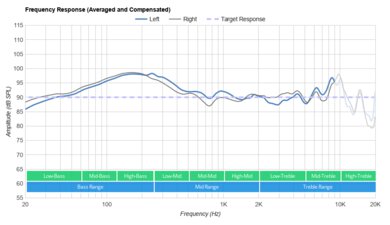
Using the 'Default' EQ preset, which results in the flattest response, the SteelSeries Arctis 7+ have a boomy sound profile. It can help emphasize sound effects like footsteps while you're gaming. Dialogue and lead instruments are bright and sparkly. If you prefer a different sound, their companion software offers robust sound customization features like a graphic and parametric EQ plus presets to help you adjust them to your liking. However, they're prone to inconsistencies in bass and treble delivery due to their design, so it's important to take the time to get a good fit.

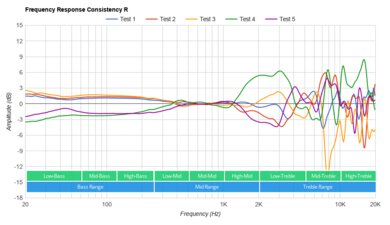
These headphones have disappointing frequency response consistency. Their audio delivery can depend on the headphones' fit, seal, and positioning on your head. You may especially notice a drop in bass if you have thick hair or wear glasses, as this can rupture the ear cups' seal.
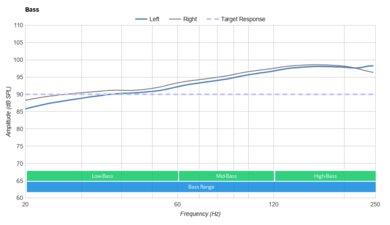
The SteelSeries Arctis 7+'s bass accuracy is alright. The response is overemphasized across the range, although the low-bass is fairly neutral, so your mixes have adequate thump and rumble. They also have intense punch and boom, which can help emphasize footsteps in first-person shooter games. That said, this overemphasis can sound very muddy.
Note: Bass delivery varies depending on fit, seal, and positioning. Our response represents the average response, and your experience may differ.
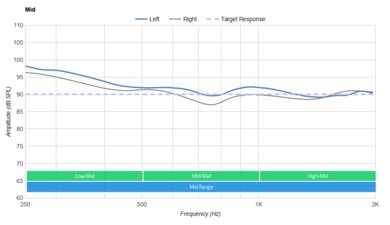
These headphones have very good mid accuracy. There's some overemphasis from the bass range that extends into the low mids, which clutters and muddies dialogue. That said, the rest of the range is fairly flat, so vocals and instruments sound present and clear.
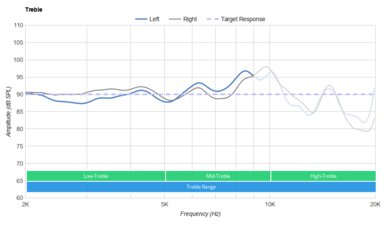
The SteelSeries Arctis 7+ have excellent treble accuracy. Vocals and lead instruments sound clear and detailed. However, sibilants like cymbals in cinematic cut scenes are bright and slightly piercing.
Note: Treble delivery varies depending on fit, seal, and positioning. Our response represents the average response, and your experience may differ.
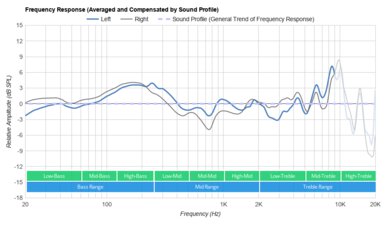
The SteelSeries Arctis 7+'s peaks and dips performance is good. There's a peak in the high-bass that adds intense boom to mixes, which can also muddy vocals and lead instruments. A dip in the mid-mid affects the right driver more prominently than the left, nudging vocals and lead instruments to the back of the mix. Another dip in the low-treble affects the left driver, dulling the upper harmonics of these sounds, and a peak in the mid-treble makes sibilants like S and T sounds piercing.
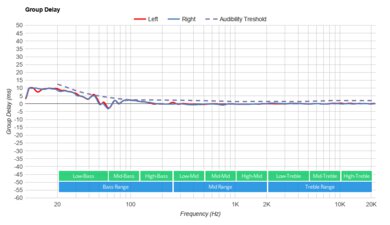
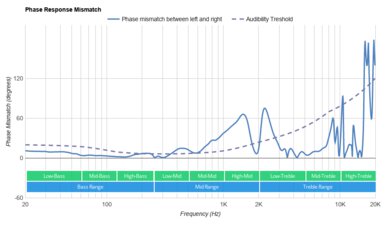
The SteelSeries Arctis 7+'s imaging performance is satisfactory. The weighted group delay falls below the audibility threshold, resulting in tight bass and transparent treble reproduction. The L/R drivers are also well-matched in frequency response, which helps stabilize the stereo image. However, there is a mismatch in phase and amplitude, and it's audible with real-life content. Audio seems a bit off-centered, and the left driver is a little louder. However, it can be hard to hear with real-life content. That said, imaging can vary between units and can indicate a manufacturer's quality control and ergonomics.
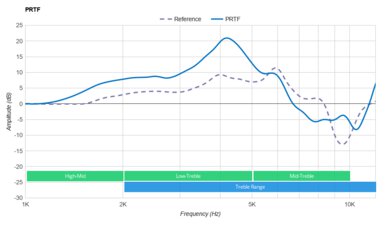
The SteelSeries Arctis 7+'s passive soundstage performance is sub-par. The soundstage is somewhat wide, and audio seems to come from out in front of you rather than inside your head. However, it doesn't feel very natural, and since they're closed-back headphones, the soundstage doesn't feel as open or spacious as open-back headphones.
The SteelSeries Arctis 7+ are fully compatible with PlayStation 5's Tempest 3D AudioTech, which you can turn on and off in the console's settings. They're also compatible with 7.1 Surround, which you can access via the Sonar tab in the SteelSeries GG app.
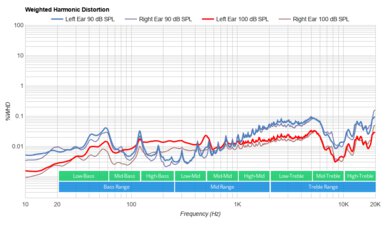
The SteelSeries Arctis 7+ have a good weighted harmonic distortion performance. There's a peak in the low to mid-treble at normal listening levels. However, this can be hard to hear with real-life content. The rest of the frequency response falls within good limits, resulting in clear and pure audio reproduction.
These are the settings used to test our headphones. Our results are only valid when using the headphones in this configuration.
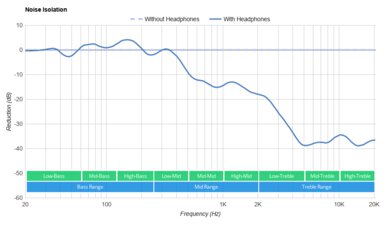
The SteelSeries Arctis 7+'s noise isolation performance is poor. Like most gaming headphones like the SteelSeries Arctis 7P+ Wireless, they don't block out commuter noise like the low rumble of bus and plane engines. They also struggle to cut down ambient chatter, although they do a much better job isolating you from an AC unit's high-pitched hum.
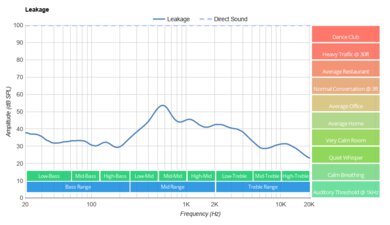
The leakage performance is decent. A lot of the leakage is concentrated in the mid-range, which sounds full-bodied. If you're gaming at high volumes, others around you can hear it, even if it's a moderately noisy environment.
Update 04/06/2022: Users have reported white noise in our 'Recording Quality' and 'Noise Handling' audio tracks. After looking into this, we noticed that this noise isn't caused by the microphone but by our testing equipment. Some headphones, like those with a boom mic, can pick up this sound produced by our equipment more prominently than headphones with an integrated mic. We're currently monitoring this issue. There hasn't been a change to the scoring of these tests.
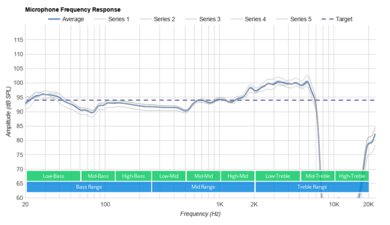
The SteelSeries Arctis 7+'s boom mic has a good recording quality. Your voice sounds clear, full-bodied, and natural.
Note: If you're a Windows user and want to use the features in the Sonar tab of the companion software, you'll need to use this setting. If you select 'Headset - Arctis 7+', the microphone still works, but any changes you've made in the Sonar table won't be in effect.
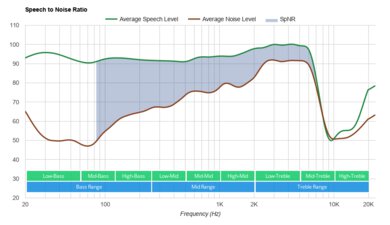
The boom mic's noise handling performance is decent. The mic can separate your voice from moderate ambient noise around you. If you're gaming near an open window with traffic outside, you'll have no problems being heard clearly.
Note: If you're a Windows user and want to use the features in the Sonar tab of the companion software, you'll need to use this setting. If you select 'Headset - Arctis 7+', the microphone still works, but any changes you've made in the Sonar table won't be in effect.
The SteelSeries Arctis 7+ have an outstanding battery performance. Like the SteelSeries Arctis 7P+ Wireless, they're advertised to last 30 hours continuously. However, we measured over 60 hours, even after repeating the test. Other SteelSeries headphones like the SteelSeries 7P Wireless also far exceed the reported battery life. That said, battery life can vary depending on usage. Luckily, the headphones are equipped with an auto-off timer to help conserve battery life when you're not using them. You can also use them while they're charging or passively with the included audio cable.
The SteelSeries GG software is great, though some users have experienced bugs the following bugs while using it: mic sidetone occasionally not turning off, Sonar chatmix sticking so you can't adjust the level and requiring you to disconnect and reconnect the dongle, and the headphones unable to enter sleep mode if the PC is in use, but there's no audio output or activity. If you've encountered issues with the software, please let us know in the forums.
Within this app, you can customize the headphones' sound to your liking using its graphic EQ and presets. However, there are more features available in Sonar, which is additional software you'll find as a tab within SteelSeries GG. Sonar offers even more robust features like a parametric EQ plus presets. The following settings have adjustable levels: 'Bass Boost', 'Treble Boost', 'Voice Clarity', 'Smart Volume', and 'General Gain'. You can access their 7.1 Virtual Surround Sound feature. A chat tab offers a 10-band EQ, noise reduction, noise gate, volume stabilizer, and impact noise reduction, all of which come with their own adjustable levels. The microphone tab has the same settings as the chat tab, but we didn't notice a difference in performance between both tabs.
The SteelSeries Arctis 7+ have great non-Bluetooth wireless connectivity. With their USB dongle, they have low latency, making them a solid choice for gaming. However, some users have reported having trouble connecting the headphones to the dongle or that the headphones aren't responsive. The headphones may not turn on either, requiring a hard reset to function correctly.
The SteelSeries Arctis 7 Plus are fully compatible with PCs when using their mini B 8-Pin to analog cable. However, if you try to use a 1/8" audio cable with their AUX port, you'll only receive audio as this port acts as a daisy chain. You can also wirelessly connect these headphones with full compatibility to your PC using the USB-C dongle.
These headphones are fully compatible with PlayStation consoles when connecting the mini B 8-pin to analog cable into the controller. You can also connect the headphones wirelessly via their USB-C dongle. Note the headphones' AUX port acts as a daisy chain port, so if you try to use it with another 1/8" audio cable, you'll only be able to receive audio.
The SteelSeries Arctis 7+ are only compatible with Xbox One and Xbox Series X|S consoles when you connect the included mini B 8-pin to analog cable into your controller. You have full audio and mic compatibility though. However, if you try to use another 1/8" audio cable with the headphones' AUX port, you'll only receive audio as this port acts as a daisy chain.







